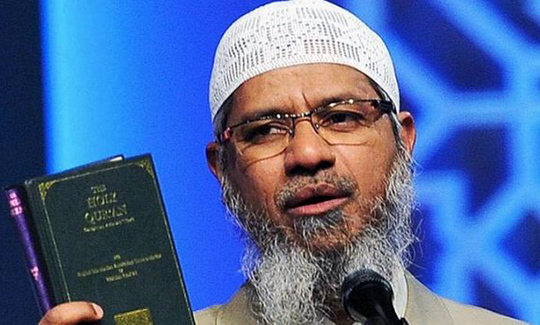New Delhi, Sep 13: In what is seen as an unusual step, the government has issued a gazette notification putting Islamic preacher Zakir Naik's NGO Islamic Research Foundation (IRF) in the prior permission list for receiving funds from abroad.

The decision to issue a gazzette notification was taken after the Ministry of Home Affairs claimed that the IRF had violated provisions of Foreign Contribution Regulations Act (FCRA). The government however did not specify what the violations are. It's worth mentioning here that the investigation agencies had recently made clear that IRF had not violated any rules.
The action comes two weeks after the Ministry of Home Affairs (MHA) renewed IRF's licence to collect foreign funds in a goof-up amid the ongoing investigations.
Government sources say a gazette notification to place an NGO under section 12 (4) of FCRA act has not been done before. The section governs acceptance of foreign donations to a non-profit organisation.
Usually an NGO flouting FCRA violations is put under prior permission list - which means it needs approval from MHA before receiving foreign contributions - by a joint secretary rank officer in the ministry.
But in IRF's case, issuing a gazette notification means that the nodal ministry - in this case home minister Rajnath Singh has approved the decision and it has been further vetted by the law ministry. It is then gazetted after assent from President and placed in a "watchlist".
Officials say IRF cannot challenge a gazette notification, which is issued under section 11 (3) (I) of the Foreign Contribution Regulation Act (FCRA) 2010.
The notification said, "Whereas, IRF, registered as Trust with Charity Commission, Mumbai, vide its Registration number - B1409/Mumbai, is also a registered organisation u/s 11 (1) of FCRA, holding registration number - 083780696R."
It adds, "Whereas, IRF was authorized to accept foreign contributions for undertaking educational and social programmes in India, which are not detrimental to the national interest", and "whereas, on the basis of records available and reports received from agencies, central government is satisfied that IRF has violated certain provisions of FCRA 2010. Now, therefore, central government, in exercise of powers conferred u/s 11 (3) (I) of said act, hereby directs that IRF shall hereinafter obtain prior permission of central government before accepting any foreign contribution, until further orders".





Comments
FACEBOOK is controlled by USA. Its not the difficult task for them to add likes or comments on anyone's account.
Attack on Zakir is pre planned. Because zakir naik's popularity is growing on all over the world. His speech encourages for non-muslims to study their scriptures, so many Christians converted to Islam in Europe and USA by getting the satisfactory answer by zakir.
Growing popularity of zakir in India or all over the world has become the nightmare for losers. So they have no option left than using their weapon as terrorism to attack on innocents.
BJP/Jumla based government failed against zakir. Now they are creating issues against zakir naik.
BJP tried all their dummy scholars to defeat zakir naik in debate. When they faced failure continuously, now they have started their big weapon impotency and lies. Its in their blood.
Jumla government is scared because growing popularity of ZAKIR will take their vote bank. his every speech converts many non-muslims to muslims.
They come to know that its difficult to defeat zakir on the base of debate, so they are using terrorism as weapon against him. Godse used muslims dressing code to attack on bapuji, RSS used arnab as their weapon.
People like arnab will sell their mother and wife for few pennies. For million rupees its not the big deal for him to attack on zakir.
This clearly shows govt. is doing injustice to Zakir Naik so far Govt. Central and State did not find anything against him since last 2 months they are doing investigation still they are putting him under prior approval list. This clearly shows govt. is misusing power against ZN. All media also not fair coverage all are covering false report particularly Times Now,
I am following him past 20 years and he is not indulging terror and he is the man of peace and for that I appreciate and I support him. He respect other religion and he tells the people what is correct in their holy books this is for Muslims, Hindus and Christians too.
I ask the reader who comments on him negatively please go to his website and listen his speeches you judge your self and do not comment on the basis of media and govt. version.
Best of luck Zakir Naik we will support you.
Can any here prove any wrong doings of Zakir Naik?. Arnab gosami is not bench mark.ZN has done a lot to promote peace and truth in religious matters. Chaddi groups which cannot survive if peace between communities start developing are afraid of ZN and plotting all means to deter him. But GOD is great... truth will win
Add new comment